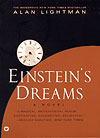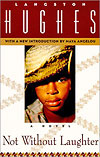
Einstein's Dreams
By Alan Lightman
I had a teacher in college who said that an actor should be like a jazz musician—willing to jump off in any emotional direction at any given moment. He should be someone who can explore variations in rhythm and melody and pacing.
At about the same time, I read this book, and it complemented my teacher's lesson by vividly manipulating time in the same way I was being asked to experiment with emotional moments. This idea of exploring all these possibilities has become part of the foundation of how I work as an actor.
By Alan Lightman
I had a teacher in college who said that an actor should be like a jazz musician—willing to jump off in any emotional direction at any given moment. He should be someone who can explore variations in rhythm and melody and pacing.
At about the same time, I read this book, and it complemented my teacher's lesson by vividly manipulating time in the same way I was being asked to experiment with emotional moments. This idea of exploring all these possibilities has become part of the foundation of how I work as an actor.

The Autobiography of Quincy Jones
Quincy Jones is a hero of mine. He went from eating rats to writing rhapsodies. It's astonishing that a man who comes from such humble beginnings could achieve so much, but he did. I couldn't believe how honest he was about his failures as a father, brother, and son, because, you know, some people sweeten their lives in the retelling. He admits that at crucial moments he ran away from his responsibilities. I can identify with that, and I see it in other people, especially here in New York, where so many people leave their family behind to become whoever it is they're going to be or to do whatever it is they're going to do. You're chasing a dream, and sometimes sacrifices are made along the way.
Quincy Jones is a hero of mine. He went from eating rats to writing rhapsodies. It's astonishing that a man who comes from such humble beginnings could achieve so much, but he did. I couldn't believe how honest he was about his failures as a father, brother, and son, because, you know, some people sweeten their lives in the retelling. He admits that at crucial moments he ran away from his responsibilities. I can identify with that, and I see it in other people, especially here in New York, where so many people leave their family behind to become whoever it is they're going to be or to do whatever it is they're going to do. You're chasing a dream, and sometimes sacrifices are made along the way.

Mules and Me
By Zora Neale Hurston
In the late 1920s, Hurston traveled to Florida and Louisiana; the result of those trips is this collection of folktales, with a few spirituals and hoodoo remedies printed in the back. I'm from a rural area in the South. My people celebrate language, storytelling, and superstitious rituals born of our folklore in ways similar to those Hurston chronicles. The most remarkable thing, though, was seeing our language in print: It inspired me to start writing.
By Zora Neale Hurston
In the late 1920s, Hurston traveled to Florida and Louisiana; the result of those trips is this collection of folktales, with a few spirituals and hoodoo remedies printed in the back. I'm from a rural area in the South. My people celebrate language, storytelling, and superstitious rituals born of our folklore in ways similar to those Hurston chronicles. The most remarkable thing, though, was seeing our language in print: It inspired me to start writing.

Not Without Laughter
By Langston Hughes
I was grabbed by how gritty and honest this book was, even though it was told from the perspective of a child. One scene reminded me of my growing up: The child's mother knows that all he wants for Christmas is a beautiful, shiny red and yellow sled. She has no money, so she has a local handyman build one out of old boards and tin for him. He's devastated, but so loves and respects his mother that he is determined to hide his disappointment. This scene of a child's bravado was one of the saddest I've ever read.
By Langston Hughes
I was grabbed by how gritty and honest this book was, even though it was told from the perspective of a child. One scene reminded me of my growing up: The child's mother knows that all he wants for Christmas is a beautiful, shiny red and yellow sled. She has no money, so she has a local handyman build one out of old boards and tin for him. He's devastated, but so loves and respects his mother that he is determined to hide his disappointment. This scene of a child's bravado was one of the saddest I've ever read.

Eyewitness
By William Loren Katz
At the public schools I went to, we were taught only a little section on black achievement—maybe a chapter on Booker T. Washington. The first time I read this book—a detailed account of the contributions black people have made to this country—I was in 11th grade. It's a collection of poetry, photographs, and excerpts from speeches, editorials, and diaries.
Back then I carried it with me everywhere, not only because I was in need of this information but because I felt it was my duty to make sure other people had it. My copy is dog-eared, but I just keep lending it out.
By William Loren Katz
At the public schools I went to, we were taught only a little section on black achievement—maybe a chapter on Booker T. Washington. The first time I read this book—a detailed account of the contributions black people have made to this country—I was in 11th grade. It's a collection of poetry, photographs, and excerpts from speeches, editorials, and diaries.
Back then I carried it with me everywhere, not only because I was in need of this information but because I felt it was my duty to make sure other people had it. My copy is dog-eared, but I just keep lending it out.

The Collected Plays of William Shakespeare
When I was growing up, I didn't understand why anybody cared about Shakespeare. Then I had a teacher who said, "Look, you know who Tupac is, and how he speaks—in a cadence and rhythm that doesn't necessarily translate to the rest of the world. That's Shakespeare." After that I wanted to learn everything about his work. In terms of human conflicts and relationships and, of course, rhythm, Shakespeare is the master. I have yet to play the roles I love—Hamlet, Malvolio, Othello—but I will be ready when the call comes.
When I was growing up, I didn't understand why anybody cared about Shakespeare. Then I had a teacher who said, "Look, you know who Tupac is, and how he speaks—in a cadence and rhythm that doesn't necessarily translate to the rest of the world. That's Shakespeare." After that I wanted to learn everything about his work. In terms of human conflicts and relationships and, of course, rhythm, Shakespeare is the master. I have yet to play the roles I love—Hamlet, Malvolio, Othello—but I will be ready when the call comes.




